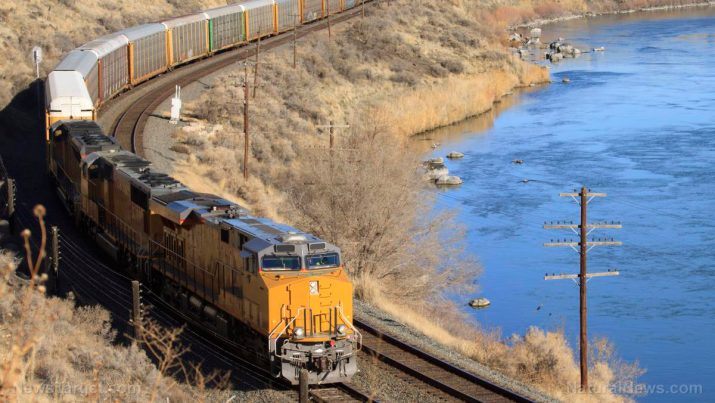
Colorado, Nebraska fight over 99-year-old water-sharing compact
Wednesday, March 23, 2022 by Mary Villareal
http://www.naturalnewsreports.com/2022-03-23-colorado-nebraska-fight-over-water-sharing-compact.html

A fight over a 99-year-old sharing compact between Colorado and Nebraska could end up in court as the South Platte River in Julesburg threatens to run dry for half the year.
Nebraska Governor Pete Ricketts announced plans to build a canal into Colorado to drain water from the South Platte several miles upstream from Julesburg, which is allowed under the 1923 agreement between the states. The project, which would cost around $500 million and would consist of some 60 miles of canals and several reservoirs, would be among the biggest nonfederal interstate water infrastructure projects in decades.
Ricketts said Nebraska wanted to get ahead of a host of projects that he believes Colorado is planning to build, mostly to serve the Denver area, which would use up water from the South Platte before it can get to the state line.
“Our estimate is that if they were to complete all of these, they would reduce the amount of water coming to Nebraska in the South Platte by 90 percent,” he said. He added that the canal will be a “historic opportunity” for the state.
The proposal stunned Colorado Governor Jared Polis, who said that Ricketts only shared his plans about the canal a few hours before announcing it publicly, adding that the move is misguided, as it is based on a list of projects that have been proposed by local governments and agencies but haven’t been approved or funded by the state. (Related: Great Salt Lake drying up amid extreme drought.)
Polis said the move seems to be based on the misunderstanding of Colorado’s intentions, adding that the plan is “this really bizarre boondoggle of a project that wouldn’t benefit Nebraska or Colorado.”
Moreover, he said Nebraska’s plan isn’t clear enough to require an urgent response, but predicted it would face court battles from landowners and other environmental groups.
He also said Colorado would defend its water rights. “We will continue to protect and aggressively assert Colorado’s rights under all existing water compacts. Colorado has been in full compliance with the South Platte Compact for the 99 years the agreement has been in place, and water has not and is not being withheld from Nebraska.”
Nebraska’s legislature took the first votes to approve the project on March 9, with funding expected to come from state reserves and $100 million in Wuhan coronavirus (COVID-19) recovery aid, earmarked for water quality.
Western states fight over water
Western states have been fighting over water since the start of the 20th century, with the fights intensifying amid rising populations. The area also experienced reduced snow and rainfall over the past few decades.
Because of the abundance of snowmelt from the Rocky Mountains, Colorado is now a prime source of water in the West, with nine signed compacts with other states over the years to define how much water it can use and how much it must let flow downstream to its neighbors.
The 1923 South Platte Compact guarantees that Colorado will send 120 cubic feet of water per second to Nebraska from April to mid-October. In the other five and a half months of the year, the state is not guaranteed any water assistance but can get water that isn’t being used by Colorado, which is typically around 250 to 300 cubic feet per second.
But there is a loophole in the compact. If Nebraska was to build a then-planned canal starting near Ovid, Colorado, it would be entitled up to 500 cubic feet of water per second from mid-October to April 1 for irrigation purposes.
While the canal has never been built despite several tries, Nebraska continues to attempt reviving it. (Related: Despite record-breaking drought conditions, California officials are draining reservoirs.)
Nebraska officials are now framing the debate as a desire to protect their water from rapid growth in the Denver area. However, the compact allows Colorado to use all the water it wants from that part of the river, or its upper basin.
Still, there are other threats to the flow of water across the state line that can only be protected if the state builds the canal. Tom Riley, the head of the Nebraska Department of Natural Resources, estimates that the canal could protect water due to Nebraska with an estimated value of $1 billion over the next 50 years, helping the state meet its goals.
Follow CleanWater.news for more related stories.
Watch the video below to learn more about water crisis.
This video is from the UD channel on Brighteon.com.
More related stories:
Water shortage on Colorado River poses severe challenge for Arizona farmers.
Drought threatens US wheat harvest, deepening global supply challenges.
“Exceptional” drought stressing crops in American West.
Catastrophic drought puts a strain on California’s hydropower supply.
California to cut water supply to cities and farmlands amid worsening drought.
Sources include:
Tagged Under: Tags: big government, canal, chaos, clean water, Colorado, government projects, infrastructure, irrigation, Nebraska, reservoirs, South Platte River, water source, water supply, water use agreement, Water Wars
RECENT ARTICLES


Colorado, Nebraska fight over 99-year-old water-sharing compact

China’s Evergrande indefinitely suspended from trading in Hong Kong Stock Exchange

Biden wants Americans to buy electric cars made with Russian aluminum
By Kevin Hughes

Bloody secret revealed: Blood of unborn cows used to create lab-grown meat
By Ramon Tomey
COPYRIGHT © 2017 NATURAL NEWS REPORTS


